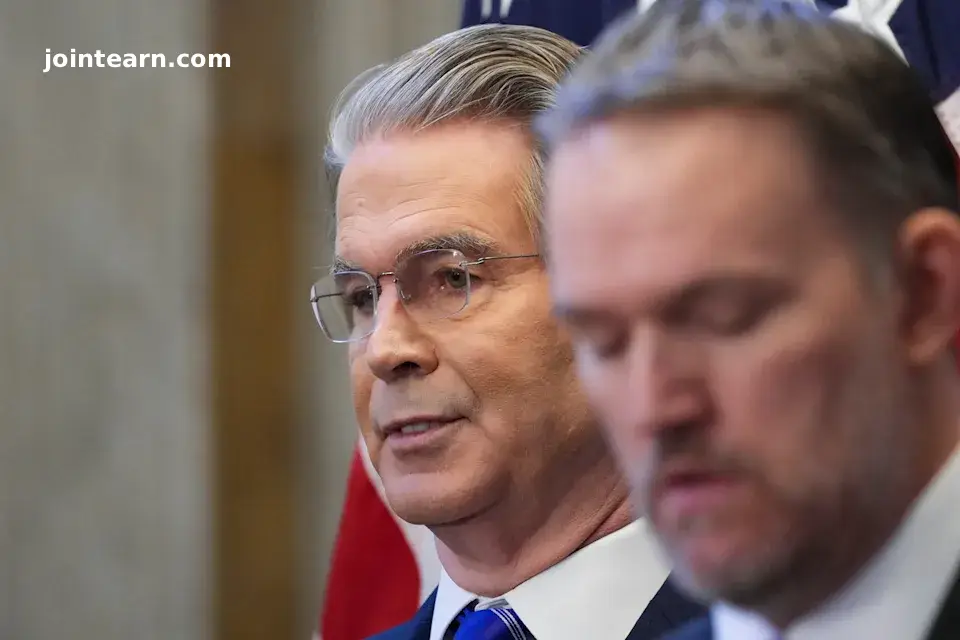
WASHINGTON, D.C. — U.S. Treasury Secretary Scott Bessent issued a sharp rebuke of China’s new rare earth export controls on Wednesday, accusing Beijing of violating prior trade accords and threatening global supply chains. However, Bessent also left the door open to a possible extension of the 90-day pause on tariffs, signaling that diplomacy remains on the table ahead of key high-level talks later this month.
“China Versus the World”
Speaking alongside U.S. Trade Representative Jamieson Greer during a joint press conference on the sidelines of the IMF–World Bank meetings in Washington, Bessent condemned China’s decision to impose sweeping restrictions on rare earth exports—materials critical to industries ranging from electric vehicles and semiconductors to defense systems and clean energy technologies.
“Make no mistake, this is China versus the world,” Bessent declared. “They have imposed unacceptable export controls on the entire world, and neither we nor our allies will be commanded or controlled by bureaucrats in Beijing.”
Greer echoed that sentiment, labeling China’s move a “supply chain power grab” and “an exercise in economic coercion against the global economy.” He warned that the controls could disrupt production of “everything from household appliances to cars,” underscoring the potential ripple effects across global industries.
Decoupling Threat Looms — But Not the Goal
Bessent said the United States and its allies are prepared to take countermeasures if China continues to weaponize access to critical materials, but emphasized that decoupling from China is not Washington’s preferred outcome.
“That’s not what we want,” Bessent said. “We want fair trade and predictability, not confrontation. But if China insists on being an unreliable partner, we’ll have no choice but to protect our interests and those of our allies.”
He added that Washington is in close contact with partner nations to coordinate a response and ensure global supply chain stability in the event that China’s export restrictions are implemented in full.
Possible Extension of Tariff Pause
The Treasury chief also revealed that the U.S. is considering extending the current 90-day tariff pause with China—a temporary truce that has prevented the activation of 100% retaliatory tariffs threatened by President Donald Trump earlier this year.
“It’s possible that the current 90-day pause could be extended,” Bessent said. “But that won’t be negotiated until after leaders meet in South Korea.”
As of Tuesday night, both Trump and Chinese President Xi Jinping were still expected to meet at the APEC summit in Seoul later this month. Bessent said he plans to travel to South Korea early to meet with his Chinese counterpart ahead of that event.
Legal and Economic Tools Still Available
Bessent also addressed the ongoing Supreme Court case challenging the president’s authority to impose tariffs under the International Emergency Economic Powers Act (IEEPA). He said the administration has “numerous other laws” it could invoke if the Court limits the president’s tariff powers.
“We have trade agreements in place, and we don’t believe any country will back out of them,” he added.
Argentina Credit Facility and Broader Financial Strategy
In a notable pivot from trade tensions, Bessent announced that the U.S. Treasury had purchased Argentine pesos earlier in the day as part of a new initiative to stabilize Argentina’s economy.
The Treasury, he said, is working on a $20 billion credit facility designed to help Argentina manage its debt obligations, supplementing an existing $20 billion in currency swap lines with private banks and sovereign wealth funds.
“We’ve been working on this for weeks,” Bessent explained. “It’s a private-sector solution to Argentina’s upcoming debt payments. Many banks and sovereign funds have already expressed interest in participating.”
If completed, the program would bring total U.S. support for Argentina to $40 billion, underscoring Washington’s broader efforts to stabilize emerging markets while navigating its own complex trade relationship with China.
Fed Chair Search and Policy Reform
Bessent confirmed that he is currently interviewing candidates for the next Federal Reserve Chair, with a shortlist of five contenders under consideration. While he did not disclose names, he said that reforming the Fed’s quantitative easing policy—its bond-buying strategy to lower borrowing costs—will be a key consideration in his decision.
“Reform of quantitative easing is an important issue as we look at Fed leadership,” Bessent said.
Global Stakes Ahead of APEC Summit
The escalating U.S.–China rare earth dispute has shaken global markets and rekindled fears of a new round of tariffs, export controls, and trade barriers that could impact industries worldwide.
Analysts say the Trump–Xi meeting at the APEC summit will be a crucial opportunity to defuse tensions and restore confidence in international trade stability. For now, Washington’s message remains firm: China can still reverse course, but time is running out.
“We’ll continue to engage,” Bessent concluded, “but the world will not allow a single country to dictate the flow of global supply chains.”


Leave a Reply